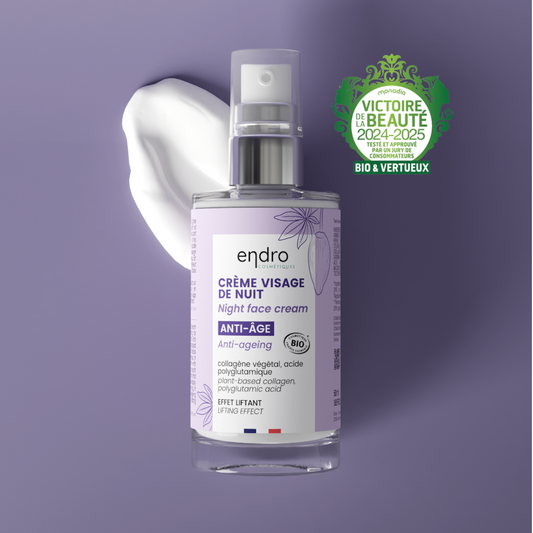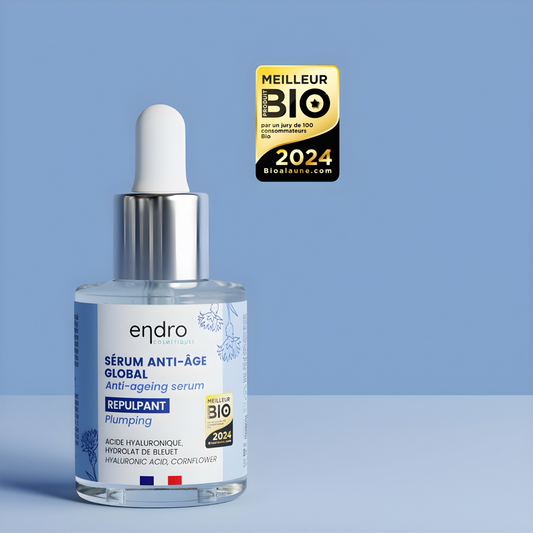Sweat odors are caused by bacteria that accumulate on contact with the toxins evacuated by our bodies. Before the 20ᵉ century and the beginning of hygienism, perspiration was not perceived as a negative social marker. It was with the economic crisis of 1930 that manufacturers played on the fear of losing one's job, to convince most of the population to use deodorant.
The first deodorant was invented in the USA in 1888 by the Mum brand. But for it to become a central product in our morning routine, the manufacturers of the time had to redouble their inventiveness and advertising.
How do deodorants work?
Deodorants act on bacteria which, by feeding on apocrine sweat (eccrine sweat has no odor), give off the odor we attribute to perspiration.
A deodorant's effectiveness relies on 3 main ingredients : an absorbent, an antibacterial and an odor-masking agent. The absorbent component, such as plant powder, clay or probiotics. They help reduce the sensation of dampness. The antibacterial component neutralizes odor-causing bacteria.
Why do we sweat ?
The skin is the largest and most versatile organ in the human body. It carries out many vital functions, one of which is perspiration. This natural physiological phenomenon plays a number of roles, such as thermoregulating the body, eliminating waste and protecting the skin by contributing to the formation of the hydrolipidic film. Sweat is produced and secreted by the sweat glands.
Where does perspiration come from?
There are two main types of perspiration: thermoregulatory perspiration and emotional perspiration. The activation of perspiration is due to the body's obedience to reflexes commanded by the hypothalamus, located in the brain, following the detection of various external signals.
- Thermoregulation : thermoregulation takes place when the body is at risk of overheating, such as during physical exertion or fever, but also when at rest, to maintain thermal equilibrium with the surrounding environment in hot weather. The body releases thermal energy by evaporating water from the surface of the skin. Sweat humidifies the skin, cooling it and regulating and lowering body temperature. Around 50% of this sweat is produced by the trunk and 25% by the legs.
- Emotional perspiration : emotional sweating is the body's instant reaction to stress, anxiety, pleasure or fear. When emotions run high, the autonomic nervous system releases stress hormones into the bloodstream, notably adrenaline. Within seconds, these activate the glands responsible for perspiration. After emotional stimulation, the axillary glands in the armpits produce a greater volume of perspiration. This type of sweating is triggered all over the body, mainly on the hands, feet and armpits, whatever the ambient temperature.

And what about the smell ?
Contrary to popular belief, sweat is virtually odorless. So it's not perspiration itself that's responsible for unpleasant odours. It's actually bacteria which, when they consume it, produce odorous chemical compounds responsible for unpleasant body odours.
Antiperspirant or deodorant ?
Antiperspirants and deodorants are two of the hygiene products used to combat unpleasant odours. Deodorants neutralize the bacteria that cause unpleasant odors. An antiperspirant tightens the skin's pores to block the sweating phenomenon, often aided by aluminum salts.
- Antiperspirants : antiperspirants help reduce the amount́ of sweat produced. They have an astringent action and thus help regulate perspiration for a few hours by coming to obstruct the glands. The main active ingredient found in antiperspirants are aluminum salts. Anti-perspirants have been much criticized of late, firstly for their mode of action: they trap toxins in the body, preventing the body's natural regulation through perspiration. Moreover, the use of aluminum salts can prevent daily use of this product.
- Deodorants : deodorants can work in two different ways. They contain either antimicrobial agents to reduce the growth of odor-causing bacteria (like our Coconut and Palmarosa deodorants), or odor-absorbing or odor-masking agents (like our Sensitive Skin, Aloe Vera and Monoi deodorants). Unlike anti-perspirants, they don't prevent perspiration production, allowing the body to evacuate toxins while regulating itself naturally ! Perspiration is a natural phenomenon that eliminates toxins from the body. Hence the current controversy surrounding antiperspirants that block this evacuation.
* Source: Endro Cosmetics












